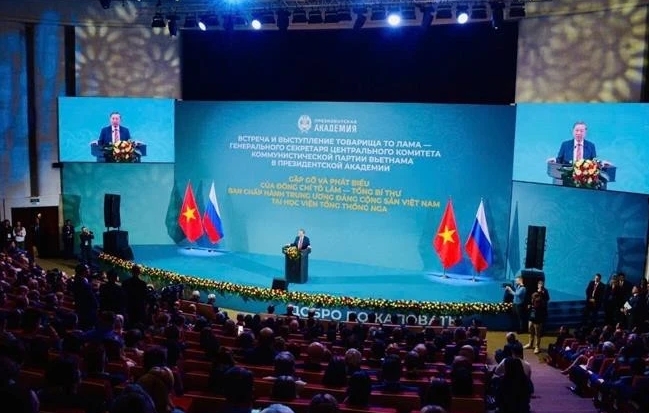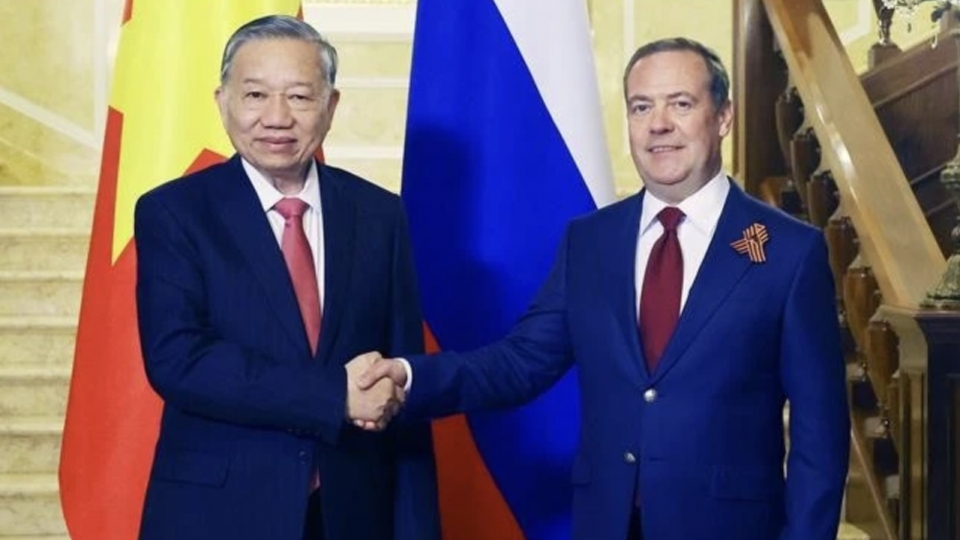Party leader stresses promoting Vietnam – Russia traditional friendship in new era
General Secretary of the Communist Party of Vietnam (CPV) Central Committee To Lam delivered a speech at the Russian Presidential Academy of National Economy and Public Administration (RANEPA) in Moscow on May 10, highlighting the cultivation of the Vietnam – Russia traditional friendship in the new era for peace, cooperation, and development.

The activity was part of his official visit to Russia, during which he also attended the ceremony marking the 80th anniversary of the Victory of the Great Patriotic War.
In his welcoming remarks, RANEPA Rector Alexey Gennadievich Komissarov noted the academy is the only educational institution under the direct management of the Russian President. Its predecessor, the Academy of Social Sciences under the Communist Party of the Soviet Union Central Committee, used to provide training for nearly 1,000 senior leaders of Vietnam, including late Party General Secretary Nguyen Phu Trong.
Stressing the significance of General Secretary Lam’s visit, Chairman of the State Duma of the Federal Assembly of the Russian Federation Vyacheslav Volodin affirmed that the State Duma is always proud of the two countries’ faithful relations. He held that the visit helps strengthen the traditional friendship and comprehensive strategic partnership between the two countries, including parliamentary cooperation.
In his speech, General Secretary Lam underscored the special bonds between the two countries for the past more than 100 years. In the 1920s, when Vietnam’s revolutionary movement was seeking its path, the Soviet Union became the lighthouse shedding light on the path to national liberation of Vietnam. President Ho Chi Minh, who founded and led the Vietnamese revolution, came to the Soviet Union early, learned from the Communist International, and accessed Marxism-Leninism there, thereby laying the ideological foundation for the establishment of the CPV in 1930. Many revolutionary predecessors such as Tran Phu, Le Hong Phong, and Ha Huy Tap also used to study and undergo training in the Soviet Union, and later became prominent leaders of Vietnam’s revolutionary movement.
The sincere and faithful assistance as well as the lofty solidarity from the Soviet Union in the past and the Russian Federation nowadays forms a precious historical heritage for both countries to continue nurturing and developing substantive cooperation at present and in the future, he stated.
Despite geographical distance, the two countries share great similarities in history, spirit, vision, and value, the General Secretary went on, adding that few countries in the world win such steadfast and deep affection from generations of Vietnamese people like the Soviet Union in the past and Russia at present.
Informing participants about Vietnam’s Doi moi (Renewal) process, he said that surmounting numerous difficulties, Vietnam has established itself as an open and dynamic economy and a growth powerhouse. Such major and significant achievements, together with the recognition from international friends, have positioned the country in a new historical starting point, confidently advancing to a new era with strategic and long-term directions for the next journey.
Lam stressed that Vietnamese and Russian leaders have exchanged views and outlined orientations to promote the exchange of delegations; conduct regular and substantive consultations and dialogues at the highest levels; elevate economic, trade, and investment cooperation, which is a key focus of the bilateral relationship.
It is necessary to prioritise and facilitate the expansion of trade, investment, and financial-credit relations in line with international law and the legal regulations of the two countries to boost the exchange of goods and services, he said, stressed that cooperation in agriculture, forestry, fisheries, mineral mining and processing, industry, machinery and energy should be stepped up.
He underlined the need to strengthening defence – security cooperation, considering it a key area in the overall Vietnam-Russia relationship, which must promptly meet the current requirements, while contributing to ensuring peace, stability, and development in the region and the world.
Furthermore, the two sides should promote cooperation in science – technology, innovation, and digital transformation as a core area of their relations, including cooperation in fundamental science, information technology, artificial intelligence (AI), automation, biomedical technology, and renewable energy, he added.
Lam stated that building nuclear power plants is currently a top priority for Vietnam, therefore, the country places special emphasis on strengthening cooperation in nuclear energy, particularly in the effective implementation of the Nuclear Science and Technology Research Centre project in Vietnam.
According to him, the two countries should strengthen cooperation in terms of education and training, culture, arts, tourism, and people-to-people exchanges; expand the activities of the network of Vietnam-Russia technical universities to promote the training of high-quality human resources. He called on RANEPA to further boost its cooperation with research institutes and universities in Vietnam, especially in public administration, and international economics and relations.
He suggested the two countries strengthen cooperation and work closely together at international and regional multilateral forums, continue to promote multilateralism, and a fair and sustainable multipolar world order, with Russia being an important pole, based on the fundamental principles of the UN Charter and international law; promote joint efforts by the international community to address non-traditional security challenges.
Lam showed his desire that Russia will continue to support the strengthening of ASEAN's central role in the Asia-Pacific regional architecture. He affirmed that Vietnam will foster close cooperation with Russia to deepen the ASEAN-Russia Strategic Partnership.
The Vietnamese leader highlighted the heroic history and great achievements of the Russian nation and people and the proud development of the bilateral relations, which has affirmed the special role and position of Russia to Vietnam, including the important contributions of RANEPA.
In his speech, Lam expressed his deep gratitude to the Russian veterans, intellectuals, and experts who have devoted their affection and support to Vietnam throughout the years, stressing that they will always remain steadfast and close friends, comrades, and brothers of the Vietnamese people.
He expressed his hope that following previous generations, the younger generations of the two countries will deeply understand the noble international spirit embodied in the unique and enduring relationship between the Vietnamese and Russian people; as well as the importance of continuing to nurture the solidarity, friendship, and close-knit cooperation between the two countries in the new era.
He believed that the two nations will continue to accompany each other on the path toward prosperity, wealth, and happiness for their people; and that the bilateral relationship will reach new heights, on par with the historical and cultural stature of each country and the requirements of the times.
On this occasion, RANEPA Rector Alexey Gennadievich Komissarov awarded the Vietnamese Party leader the academy's "Honorary Professor" title. He also handed over a copy of a thesis by late CPV General Secretary Nguyen Phu Trong. The late leader defended this thesis, which is about the CPV’s activities to strengthen relations with the public based on the experience of the Communist Party of the Soviet Union, in 1983.



